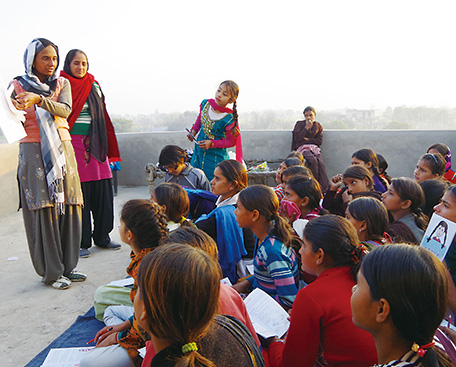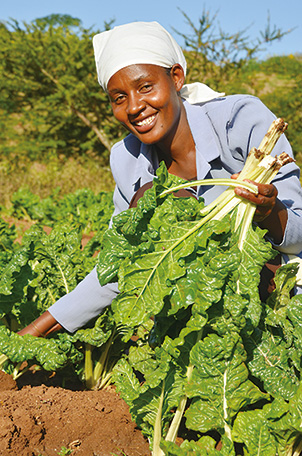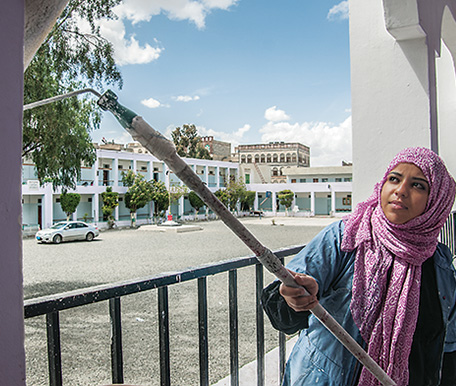ODA Topics 02
Creating a society in which all women shine
| It will be difficult to achieve poverty eradication without empowering women and realizing gender equality
Gender equality and the empowerment of women are important issues for international cooperation. Many initiatives have been implemented to improve the condition of women in developing countries. They have collectively resulted in a shift towards decreased disparities between men and women in education, health care, economics, and other fields. Even so, women continue to face difficult situations around the world. Japan is no exception. Making workplaces friendlier to women, and increasing opportunities for women to enter the workforce and participate in meaningful activities are also pressing issues in Japan. Japan is now carrying out various measures to create a society in which all women shine. There are still a number of places around the world where women are placed at the bottom of the social pyramid just for being women, and are provided insufficient access to education and medical care, all of which makes it difficult for women to have normal lives. Regardless of whether a country is developed or developing, the elimination of gender-based prejudice, inequity and disparities and the creation of a society in which everyone can harness his or her capabilities and live while feeling safe and secure are common goals that need to be pursued by all countries in the world.
Prime Minister Shinzo Abe raised the issue of creating a society in which all women shine in an address at the General Assembly of the United Nations in September 2013. Specifically, this means stepping up its cooperation with the international community and its assistance to developing countries based on the idea that capitalizing on the “power of women” as Japan's most underutilized resource and creating a society in which all women shine will greatly energize the world.
But just what sort of support has been provided by Japan towards the creation of a society in which all women shine? The following are just a few specific examples.
| Support for the distribution of hygienic and safe sanitary goods in India

The project contributes to increasing schooling opportunities and the social rise of women by communicating basic knowledge about menstruation and methods to use sanitary goods to girls and by enhancing their hygiene awareness (Photo: Unicharm Corporation)
India has rapidly developed in recent years, but the practice of using sanitary goods has yet to take root in the country's agricultural communities. Many women continue to use old scraps of cloth and refrain from leaving their homes while menstruating, and many do not even know of the existence of hygienic sanitary goods or about the menstruation mechanism. Although the practice of using sanitary goods is catching on in urban areas, many women still have an insufficient understanding of how to select sanitary goods that are appropriate for them and how to use sanitary goods in a proper way.
In response to this situation, since January 2013 JICA has been working with the Unicharm Corporation, a company that manufactures and sells sanitary goods in Japan and that is now looking to expand its businesses into India, by targeting its women. JICA and Unicharm are cooperating with a local NGO which specializes in providing assistance to women to investigate the state of hygiene and sanitary goods usage in a number of areas with different cultures and customs while offering women and girls education about menarche. This project is helping to expand opportunities for women to attend school, to engage in more activities, and to actively participate in society by teaching them about the mechanism of menstruation and how to properly use sanitary goods to enhance their physical and hygiene awareness and deepen their understanding in these matters.
| Support to enhance the organization of smallholder horticulture farmers from a gender perspective in Kenya

A woman from a farmers' group. Her work has transformed from “farming and selling crops” to “growing crops for sale” (Photo: Takeshi Kuno / JICA)
Agriculture is an important industry for Kenya, consisting of 24% of the country's GDP and producing 80% of its jobs. Growth in the field of horticulture has been particularly remarkable, so Japan is now supporting smallholder horticulture farmers' groups to develop capabilities that enable them to manage their farms in such a way that responds to the market. Since over 70% of farming work for the smallholder farms targeted by this project is done by women, this project has been dealing with gender issues as well. For instance, the project is promoting gender equality in the provision of training opportunities and carrying out training sessions on the management of household income that teach the trainees how to decide on ways to use their profits through discussions between women and men.
As a result, the relationships between husbands and wives within the targeted farm households have gone from being a “boss-worker” relationship to one of “equal management partners.” At the same time, the project has enhanced the efficiency of farm management, and increased the incomes of both women and men in the supported farm households. The increase among women has been particularly high – the income disparity between women and men has shrunk from 31% to 15% since the start of the first phase of the project. The project is currently moving forward with the second phase, and is using the experience gained up to this point to conduct its activities in a wider area.
The Ministry of Agriculture, Livestock, and Fisheries, is cooperating for this project, and has highly praised the project's gender-based approach. The Ministry requested that Japan provide technical cooperation to promote gender mainstreaming in a wider range of farming support projects based on this experience, so in September 2014 Japan began the Project on Enhancing Gender Responsive Extension Services in Kenya.
| Support through an International Organization: Empowering Women and Creating Jobs for Young People in the Middle East and North Africa

1,200 young men and women have found work or started a business as a result of UNDP's Youth Empowerment and Employment Programme in Yemen. Although once thought of as men's work, women now learn how to paint and work as painters (Photo: UNDP Yemen).
The unemployment rate among young people in the Arab region is extremely high. In some countries, over 30% of the young working population is unemployed. For instance, in Yemen, half of the unemployed are young people. Ensuring the social participation of the youth is indispensable to the maintenance of social stability in any country. Since 2012, Japan has been supporting a job creation project for youth run by the United Nations Development Programme (UNDP) in six countries in the Middle East and North Africa (Algeria, Egypt, Morocco, Tunisia, Jordan, and Yemen). The program works through a wide range of activities, from the creation of proposals on employment policies, to the provision of vocational training and employment opportunities through partnerships with NGOs and companies. This initiative has empowered many young people, including women in agricultural communities, by supporting them to start businesses and to find jobs that suit them. There are young women who had rarely gone out before because of their conservative cultures imposed on them, received training through this program in skills such as painting and sewing, gained self-confidence and became financially independent. They are developing new clients through networks of women, and enjoying their jobs.
